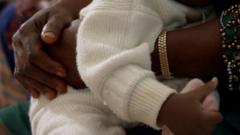In Nigeria, Chioma fiercely asserts her claim to baby Hope, a boy she believes is her miracle child after eight long years of unsuccessful attempts at conception. However, the couple faces skepticism from family members and local authorities who question the legitimacy of such a miraculous pregnancy. Chioma reports an excruciating journey forcing her into a clandestine clinic promising unconventional fertility treatments, part of a larger—and fraudulent—network exploiting women’s desires for motherhood.
The investigation by BBC Africa Eye has exposed the troubling "cryptic pregnancy" scam, a disturbing phenomenon that exploits women desperate to conceive. Reportedly, scammers posing as medical professionals charge substantial fees for dubious treatments that include invasive injections or untested substances, leading women to believe they are carrying babies even in the absence of scientific evidence.
Once women undergo this fake treatment, they are warned against consulting legitimate medical providers, leading to a cycle of misinformation. When the time comes to "deliver" the baby, women are often sedated or forced into complicity in horrific procedures that leave them with children who are trafficked for profit. Undercover reporting captured the chilling reality of these so-called clinics, where celebratory announcements of pregnancy disguise a malignant enterprise.
The scam has been supported by a network of disinformation spread across platforms that exploits the vulnerability of women globally, notably in Facebook groups that perpetuate myths about pregnancy. Reports indicate that women across Nigeria, South Africa, the Caribbean, and even the US succumb to misleading claims of miraculous treatments, further complicating the issue.
In Anambra state, health commissioner Ify Obinabo is racing against time to dismantle these operations and provide support to victims. During a raid on one facility, authorities discovered a full-scale operation complete with young women held captive, reflecting the grim and pervasive nature of the scam. Uju, revealing her troubling experience, articulated the confusion and regret stemming from being caught in this deceitful web.
Despite the skepticism of the commissioner regarding Chioma's claims, her plea for understanding as a victim reveals the deep systemic issues at play regarding women's reproductive rights and societal pressures surrounding motherhood. Until attitudes shift, and vulnerability is met with support rather than exploitation, these shocking scams appear all too likely to continue.
To delve further into this critical issue and witness the investigative findings, viewers can access the full documentary on iPlayer or YouTube.




















